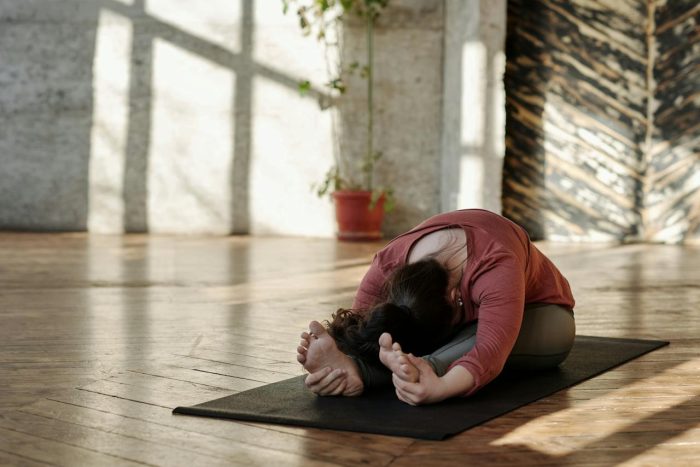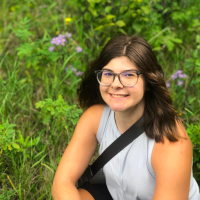*Editor’s Note: Elephant is not your doctor or hospital. Our lawyers would say “this web site is not designed to, and should not be construed to provide medical advice, professional diagnosis, opinion, or treatment to you or any other individual, and is not intended as a substitute for medical or professional care and treatment. Always consult a health professional before trying out new home therapies or changing your diet.” But we can’t afford lawyers, and you knew all that. ~ Ed
~
As a yoga teacher living with Persistent Depressive Disorder and Generalized Anxiety Disorder, I have found that there is a profound relationship between my mental health and my yoga practice.
They affect one another in a multitude of ways. My mental illnesses seep into every aspect of my life, and this includes my time on my mat, both as a yoga student and as a teacher. Additionally, the effects of my yoga practice are far-reaching, affecting many parts of me including my mental health.
My struggles with my mental health have led me to believe that I am not worthy of teaching yoga.
As a result of how much I was struggling, I began to think that I wasn’t healthy or well enough to teach yoga. However, yoga has shown me that I am enough as I am and that I am just as worthy of teaching yoga as the next person. I have struggled with things in my life, but so has everyone else living on this earth right now. My life is by no means perfect, but nobody is living a perfect life. These things do not mean that I shouldn’t be teaching yoga.
If you know anything about yoga, you know that the breath is an essential part of the practice. As part of my mental health struggles, I will often get this big ball in my throat and I will feel intense pressure on my chest. It feels like there is a big rock sitting on my chest. These physical symptoms make the simple act of breathing much more challenging. During these times, trying to make my breath deeper or change it in any way is completely out of reach for me. If I am being honest, there are times where I think: “Who am I to be a yoga teacher if I can’t even breathe properly?”
When I struggle with my mental health, making it to my yoga mat takes a ton of effort, energy, and patience that I do not have. It takes effort to put on my yoga clothes, tie my hair up, step onto my mat, decide what poses to do and what kind of practice to do. It takes so much physical, mental, and emotional energy to move my body on my mat.
It also takes a great deal of patience with myself to understand that depression drastically changes how my yoga practice feels. Normally, yoga feels so good, but depression takes nearly, if not all, of the enjoyment out of it. With all of the external pressures, including the ever-so-popular Instagram hashtag #yogaeverydamnday, I can’t help but think: “If I can’t even show up to my mat, who am I to teach yoga?”
There is this belief in the yoga community that if you are living a healthy lifestyle you shouldn’t need to take antidepressants. Yogis believe that taking a natural and holistic approach for treating mental illness is enough. For instance, some individuals believe that taking supplements, eating whole foods, and practicing yoga is all that is needed. This is not a realistic or rational viewpoint. So many people need psychiatric medications to function day to day, and this includes me.
The simple truth of the matter is that I may not still be here if it wasn’t for my antidepressants. You can be doing all the right things and still be struggling with your mental health. In this case, medication is necessary.
My yoga practice has a tremendous impact on my mental health. It helps me to be more compassionate and kind toward myself. This makes a world of difference for my mental health and overall well-being.
The community and social connection I receive from the yoga studio is also something I deeply appreciate. Yoga accepts me as I am, with all of my flaws and imperfections. It helps me to get into my body and out of my mind. It helps me to be present. It opens me up to the possibilities that exist around me.
I appreciate the space that yoga offers to care for myself. I have often felt victim to the urgency and rush of life. However, yoga shows me that I can take my time, that life is not a race, and that there is not a timeline for life.
Yoga supports me in moving my body naturally and intuitively. It gives me permission to practice postures in a way that feels good for me. It gives me tools that I use on and off my mat along with the tools that I have obtained from therapy. These tools include mindfulness, working with the breath, practicing self-kindness and self-compassion, and self-awareness.
I feel disconnected from myself and my journey as a result of my mental illnesses. However, the opportunities that yoga offers for self-inquiry and self-reflection help me connect to myself once again. For so many years, my mental illness seemed to encompass my entire identity. It was what I focused so much of my energy on that I didn’t have any energy left to consider what I may want to do with my life, or what my goals or dreams might be.
Depression takes away your ability to dream. Yet, years of therapy along with my yoga practice and other healing tools allowed me to form a list of hopes, dreams, and goals.
As a result of my anxiety and depression, I now support others with their own mental health. I work to raise awareness around mental health and end the stigma. I am currently teaching a weekly yoga class for anxiety at a studio. I also have a YouTube channel where I have a variety of yoga classes for anxiety.
I will be forever grateful for the role that yoga has played in my life. I am looking forward to discovering where this journey leads me.
~
Please consider Boosting our authors’ articles in their first week to help them win Elephant’s Ecosystem so they can get paid and write more.












Read 7 comments and reply